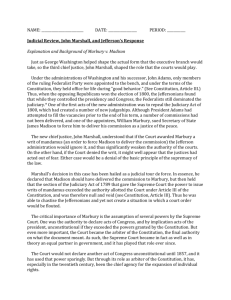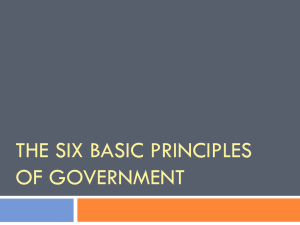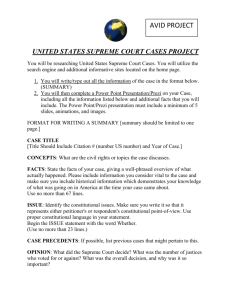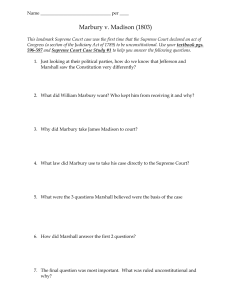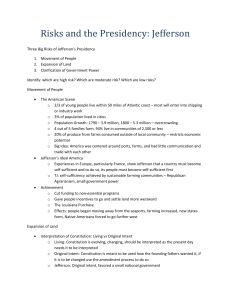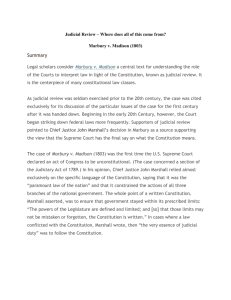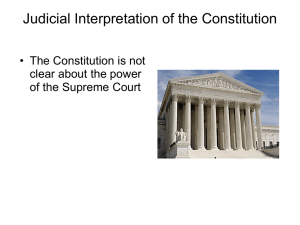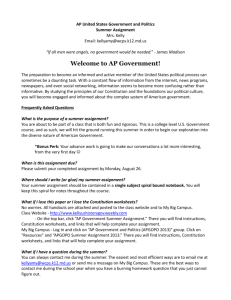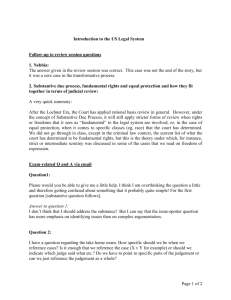Marbury v. Madison (1803)
advertisement
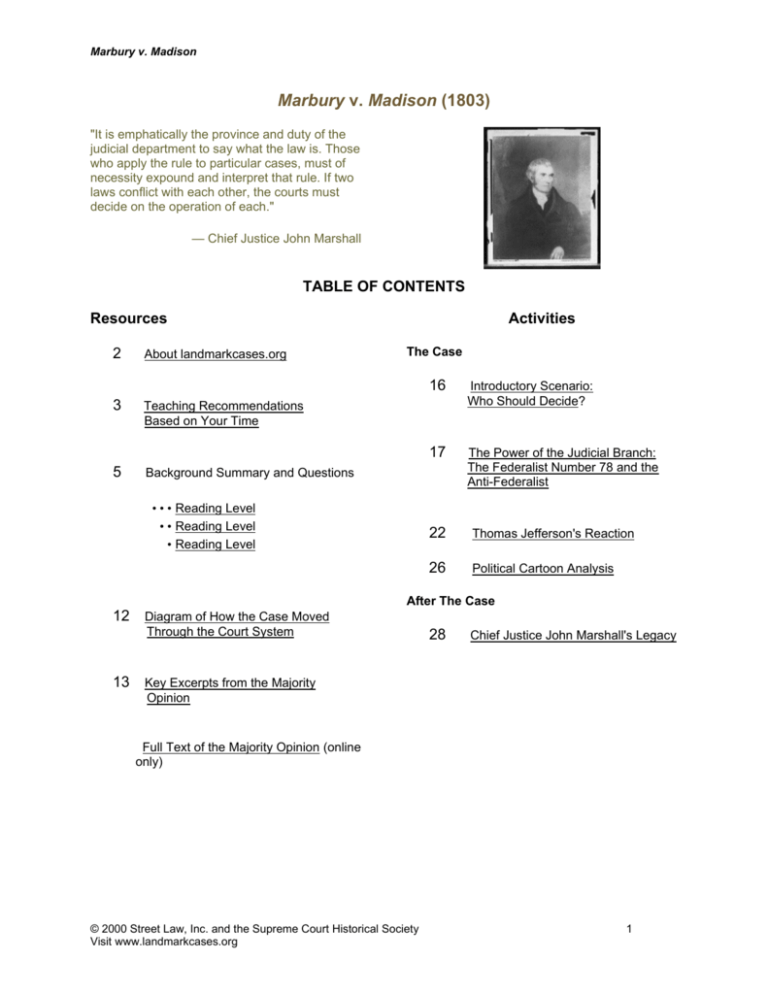
Marbury v. Madison Marbury v. Madison (1803) "It is emphatically the province and duty of the judicial department to say what the law is. Those who apply the rule to particular cases, must of necessity expound and interpret that rule. If two laws conflict with each other, the courts must decide on the operation of each." — Chief Justice John Marshall TABLE OF CONTENTS Resources 2 3 5 About landmarkcases.org Activities The Case 16 Introductory Scenario: Who Should Decide? 17 The Power of the Judicial Branch: The Federalist Number 78 and the Anti-Federalist Teaching Recommendations Based on Your Time Background Summary and Questions • • • Reading Level • • Reading Level • Reading Level 12 Diagram of How the Case Moved 22 Thomas Jefferson's Reaction 26 Political Cartoon Analysis After The Case Through the Court System 28 Chief Justice John Marshall's Legacy 13 Key Excerpts from the Majority Opinion Full Text of the Majority Opinion (online only) © 2000 Street Law, Inc. and the Supreme Court Historical Society Visit www.landmarkcases.org 1 Marbury v. Madison About landmarkcases.org This site was developed to provide teachers with a full range of resources and activities to support the teaching of landmark Supreme Court cases, helping students explore the key issues of each case. The "Resources" section features basic building blocks such as background summaries and excerpts of opinions that can be used in multiple ways. The "Activities" section contains a range of short activities and in-depth lessons that can be completed with students. While these activities are online, many of them can be adapted for use in a one-computer classroom or a classroom with no computer. Depending upon the amount of time you have to teach the case, you may want to use one or more of the "Resources" or "Activities" in conjunction with one or more of the general teaching strategies. These general teaching strategies include moot court activities, political cartoon analysis, continuum exercises, and Web site evaluation. If you have time constraints, look at the Teaching Recommendations on page 3. Feel free to experiment with these materials! © 2000 Street Law, Inc. and the Supreme Court Historical Society Visit www.landmarkcases.org 2 Marbury v. Madison Teaching Recommendations Based on Your Time If you have one day . . . • Begin with the "Introductory Scenario." • Read the "Background" as a class. Have students identify the arguments for each side and predict the outcome. • For homework, have students read the excerpt of the opinion and answer the accompanying questions. If you have two days . . . • Begin with the "Introductory Scenario." • Read the "Background" as a class. • Complete the activity titled "Using Documents to Decide the Outcome: The Constitution and the Judiciary Act of 1789." Have students finish the questions for homework. • On the second day, discuss students' responses to questions. • As a class, read the excerpts from the majority opinion. Have students answer questions. Discuss responses. • Discuss how the Court's opinion differed from students' opinions. If you have three days . . . • Complete all activities listed for the first two days. • On the third day, have students predict how different individuals, such as Republicans may have reacted to the outcome. Complete the activity "Thomas Jefferson's Reaction." • Wrap up the discussion with the "Political Cartoon Analysis." This could also be done for homework or used in an assessment. If you have four days . . . • Begin with the "Introductory Scenario." • Read the "Background" as a class. • Have students complete the activity, "The Power of the Judicial Branch . . ." Students can finish the questions for homework. • On the second day, discuss students' responses to the questions that accompany "The Power of the Judicial Branch . . . " © 2000 Street Law, Inc. and the Supreme Court Historical Society Visit www.landmarkcases.org 3 Marbury v. Madison • Complete the activity "Using Documents to Decide the Outcome: The Constitution and the Judiciary Act of 1789." Discuss students' responses to and predictions of the outcome. • On the third day, review students' predictions. • As a class, read the excerpts from the majority opinion. Have students answer questions. Discuss responses. • Discuss how the Court's opinion differed from students' opinions. • On the fourth day, have students predict how different individuals, such as Republicans may have reacted to the outcome. Complete the activity "Thomas Jefferson's Reaction." • Wrap up the discussion with the "Political Cartoon Analysis." This activity could also be assigned for homework or used in an assessment. © 2000 Street Law, Inc. and the Supreme Court Historical Society Visit www.landmarkcases.org 4 Marbury v. Madison Marbury v. Madison (1803) Background Summary and Questions • • • Thomas Jefferson, a member of the Republican Party, won the election of 1800. The outgoing President, John Adams, proceeded to rapidly appoint 58 members of his own party to fill government posts created by Congress. It was the responsibility of the Secretary of State, John Marshall, to "deliver the commissions," finish the paperwork, and give it to each of the newly appointed judges. Although Marshall signed and sealed all of the commissions, he failed to deliver 17 of them to the respective appointees. Marshall assumed that his successor would finish the job, but when Jefferson became President, he told his new Secretary of State, James Madison, not to deliver some of the commissions, because he did not want members of the opposing political party to take office. Those individuals couldn't take office until they actually had their commissions in hand. William Marbury, whom Adams had appointed as justice of the peace of the District of Columbia, was one of these last-minute appointees who did not receive his commission. Marbury sued James Madison and asked the Supreme Court of the United States to issue a writ of mandamus, a court order that requires an official to perform or refrain from performing a certain duty. In this case, the writ would have ordered Madison to deliver the commission. Marbury argued that he was entitled to his commission and that the Judiciary Act of 1789 gave the Supreme Court of the United States original jurisdiction to issue a writ of mandamus. Madison disagreed. When the case came before the Court, John Marshall — the person who had failed to deliver the commission in the first place — was the new Chief Justice. If this situation were to arise today, Marshall would likely disqualify himself because of a conflict of interest. © 2000 Street Law, Inc. and the Supreme Court Historical Society Visit www.landmarkcases.org 5 Marbury v. Madison Marbury v. Madison (1803) Background Summary and Questions • • • Questions to Consider: 1. Who was Marshall likely to side with, Marbury or Madison? Why? 2. If the Court decided that Marbury was entitled to the commission, how could it be sure that the executive branch would deliver it? Does the Court have the power to force compliance? What would happen if the Court issued the writ, but the executive branch refused to comply? 3. According to Article 3, Section 2 of the Constitution, in what types of cases does the Supreme Court of the United States have original jurisdiction? Does the Congress have the authority to alter the Court's jurisdiction? © 2000 Street Law, Inc. and the Supreme Court Historical Society Visit www.landmarkcases.org 6 Marbury v. Madison Marbury v. Madison (1803) Background Summary and Questions • • Thomas Jefferson, a member of the Republican Party, won the election of 1800. Before Jefferson took office, John Adams, the outgoing President who was a Federalist, quickly appointed 58 members of his own party to fill government jobs created by Congress. He did this because he wanted people from his political party in office. It was the responsibility of Adams' Secretary of State, John Marshall, to finish the paperwork and give it to each of the newly appointed officials. Although Marshall signed and sealed all of the papers, he failed to deliver 17 of them to the appointees. Marshall thought his successor would finish the job. But when Jefferson became President, he told his new Secretary of State, James Madison, not to deliver some of the papers. Those individuals couldn't take office until they actually had their papers in hand. Adams had appointed William Marbury to be justice of the peace of the District of Columbia. Marbury was one of the last-minute appointees who did not receive his papers. He sued Adams' Secretary of State, James Madison, and asked the Supreme Court of the United States to issue a court order requiring that Madison deliver his papers. Marbury argued that he was entitled to the job and that the Judiciary Act of 1789 gave the Supreme Court of the United States original jurisdiction to issue a writ of mandamus, which is the type of court order he needed. When the case came before the Court, John Marshall — the person who had failed to deliver the commission in the first place — was the new Chief Justice. The Court had to decide whether Marbury was entitled to his job, and if so, whether the Judiciary Act of 1789 gave the Court the authority it needed to force the Secretary of State to appoint Marbury to his position. © 2000 Street Law, Inc. and the Supreme Court Historical Society Visit www.landmarkcases.org 7 Marbury v. Madison Marbury v. Madison (1803) Background Summary and Questions • • Questions to Consider: 1. Keeping in mind his role in the original appointments, who was Chief Justice Marshall likely to side with, Marbury or Madison? Why? 2. If the Court decided that Marbury was entitled to his job, how could it be sure that the executive branch would deliver it? Does the Court have the power to force compliance? What would happen if the Court issued the writ, but the executive branch refused to comply? 3. According to Article 3, Section 2 of the Constitution, in what types of cases does the Supreme Court of the United States have original jurisdiction? Does the Congress have the authority to change the Court's jurisdiction? © 2000 Street Law, Inc. and the Supreme Court Historical Society Visit www.landmarkcases.org 8 Marbury v. Madison Marbury v. Madison (1803) Background Summary and Questions • Vocabulary sued (to sue) Define: Use in a sentence: appointed (to appoint) Define: Use in a sentence: writ Define: Use in a sentence: The President of the United States has the power to appoint judges to the federal courts. Usually, the President appoints individuals who are members of his political party or who share his ideas about politics. In 1800, John Adams was President. There was an election that year. Thomas Jefferson, who belonged to another political party, got elected. There were many positions in the federal government that were empty. Before he left office, President Adams tried to fill these positions with people who shared his ideas. President Adams appointed 58 new people. He asked his Secretary of State, John Marshall, to deliver the paperwork to these people so they could start their new jobs. Marshall delivered most of the papers. He was in a hurry, so he left some of the papers for the new Secretary of State, James Madison, to deliver. When he came into office, President Thomas Jefferson told Madison not to deliver the papers to some of the people Adams had appointed. © 2000 Street Law, Inc. and the Supreme Court Historical Society Visit www.landmarkcases.org 9 Marbury v. Madison One of the individuals who didn't receive his papers was William Marbury. He sued James Madison and tried to get the Supreme Court of the United States to issue a writ of mandamus. A writ is a court order that forces an official to do something. Marbury argued that a law passed by Congress (the Judiciary Act of 1789) gave the Supreme Court of the United States the power to issue this writ. If the Court issued the writ, Madison would have to deliver the papers. Then Marbury would become a justice of the peace. The Supreme Court of the United States had to decide the case. The new Chief Justice of the United States was John Marshall. He was the same person who had been unable to deliver the paperwork in the first place! © 2000 Street Law, Inc. and the Supreme Court Historical Society Visit www.landmarkcases.org 10 Marbury v. Madison Marbury v. Madison (1803) Background Summary and Questions • Questions to Consider: 1. Why would the President appoint people who are members of his same political party? 2. Why do you think Thomas Jefferson did not want the people Adams appointed to get their jobs? 3. Who is Chief Justice John Marshall likely to agree with? Why? 4. When the Supreme Court of the United States makes a decision, how do they get people to obey it? In other words, who enforces it? If the Court issued a writ to force Madison, a member of the executive branch, to deliver the commission to Marbury, who would enforce it? 5. How would Chief Justice Marshall and the other members of the Court look to the public if they made a decision and people refused to obey it? 6. According to Article 3, Section 2, Clause 2 of the Constitution, does the Supreme Court of the United States have original jurisdiction to issue writs of mandamus? 7. If Congress passes a law that conflicts with the Constitution, which one are we required to follow: the new law or the U.S. Constitution? © 2000 Street Law, Inc. and the Supreme Court Historical Society Visit www.landmarkcases.org 11 Marbury v. Madison Diagram of How the Case Moved Through the Court System William Marbury brought his case directly to the Supreme Court because the Court had original jurisdiction over the case. He asked the Court to issue a writ of mandamus to order James Madison to deliver his commission. • Supreme Court of the United States Marbury v. Madison (1803) The Supreme Court of the United States declared that: • Marbury is entitled to the commission, but: • The Court cannot issue the writ because the Judiciary Act of 1789, which granted the Supreme Court original jurisdiction to issue writs of mandamus, is unconstitutional. • The Supreme Court of the United States has the power to review acts of other branches and determine their constitutionality. This power is called judicial review. Article II, Section 2 lays out the original jurisdiction of the Supreme Court o "In all Cases affecting Ambassadors, other public Ministers and Consuls, and those in which a State shall be a Party, the supreme Court shall have original Jurisdiction." For more on the original jurisdiction of the Supreme Court of the United States, visit http://www.law.cornell.edu/lexicon/originaljur.html. © 2000 Street Law, Inc. and the Supreme Court Historical Society Visit www.landmarkcases.org 12 Marbury v. Madison Key Excerpts from the Majority Opinion Chief Justice John Marshall delivered the opinion of the Court. In the order in which the court has viewed this subject, the following questions have been considered and decided. 1. Has the applicant a right to the commission he demands? 2. If he has a right, and that right has been violated, do the laws of his country afford him a remedy? 3. If they do afford him a remedy, is it a mandamus issuing from this court? ••• In order to determine whether he is entitled to this commission, it becomes necessary to inquire whether he has been appointed to the office. . . . Mr. Marbury . . . since his commission was signed by the president, and sealed by the secretary of state, was appointed. . . . To withhold the commission, therefore, is an act deemed by the court not warranted by law, but violative of a vested legal right. This brings us to the second inquiry; which is, 2. If he has a right, and that right has been violated, do the laws of his country afford him a remedy? The very essence of civil liberty certainly consists in the right of every individual to claim the protection of the laws, whenever he receives an injury. . . . It is then the opinion of the Court, 1. That by signing the commission of Mr. Marbury, the president of the United States appointed him a justice of peace . . . and that the seal of the United States, affixed thereto by the secretary of state, is conclusive testimony of the verity of the signature, and of the completion of the appointment; and that the appointment conferred on him a legal right to the office for the space of five years. 2. That, having this legal title to the office, he has a consequent right to the commission; a refusal to deliver which is a plain violation of that right, for which the laws of his country afford him a remedy. It remains to be inquired whether, 3. He is entitled to the remedy for which he applies. This depends on, 1. The nature of the writ applied for. 2. The power of this court. 1. The nature of the writ. . . . This writ, if awarded, would be directed to an officer of government, and its mandate to him would be . . . "to do a particular thing therein specified, which appertains to his office and duty, and which the court has previously determined or at least supposes to be consonant to right and justice . . . " These circumstances certainly concur in this case. . . . This, then, is a plain case of a mandamus, either to deliver the commission, or a copy of it from the record; and it only remains to be inquired, Whether it can issue from this court. The act to establish the judicial courts of the United States authorizes the supreme court "to issue writs of mandamus, in cases warranted by the principles and usages of law, to any courts appointed, or persons holding office, under the authority of the United States." The secretary of state, being a person, holding an © 2000 Street Law, Inc. and the Supreme Court Historical Society Visit www.landmarkcases.org 13 Marbury v. Madison office under the authority of the United States, is precisely within the letter of the description; and if this court is not authorized to issue a writ of mandamus to such an officer, it must be because the law is unconstitutional. . . . The constitution vests the whole judicial power of the United States in one supreme court, and such inferior courts as congress shall, from time to time, ordain and establish. . . . In the distribution of this power it is declared that "the supreme court shall have original jurisdiction in all cases affecting ambassadors, other public ministers and consuls, and those in which a state shall be a party. In all other cases, the supreme court shall have appellate jurisdiction. . . . " If it had been intended to leave it in the discretion of the legislature to apportion the judicial power between the supreme and inferior courts according to the will of that body, it would certainly have been useless to have proceeded further than to have defined the judicial power, and the tribunals in which it should be vested.. . . If congress remains at liberty to give this court appellate jurisdiction, where the constitution has declared their jurisdiction shall be original and original jurisdiction where the constitution has declared it shall be appellate; the distribution of jurisdiction, made in the constitution, is form without substance. . . . To enable this court then to issue a mandamus, it must be shown to be an exercise of appellate jurisdiction, or to be necessary to enable them to exercise appellate jurisdiction. . . . It is the essential criterion of appellate jurisdiction, that it revises and corrects the proceedings in a cause already instituted, and does not create that cause. . . . The authority, therefore, given to the supreme court, by the act establishing the judicial courts of the United States, to issue writs of mandamus to public officers, appears not to be warranted by the constitution. . . . The powers of the legislature are defined and limited; and that those limits may not be mistaken or forgotten, the constitution is written. . . . Certainly all those who have framed written constitutions contemplate them as forming the fundamental and paramount law of the nation, and consequently the theory of every such government must be, that an act of the legislature, repugnant to the constitution, is void. . . . It is emphatically the province and duty of the judicial department to say what the law is. Those who apply the rule to particular cases, must of necessity expound and interpret that rule. If two laws conflict with each other the courts must decide on the operation of each. . . . So if a law be in opposition to the constitution; if both the law and the constitution apply to a particular case, so that the court must either decide that case conformably to the law, disregarding the constitution; or conformably to the constitution, disregarding the law; the court must determine which of these conflicting rules governs the case. This is of the very essence of judicial duty. . . . © 2000 Street Law, Inc. and the Supreme Court Historical Society Visit www.landmarkcases.org 14 Marbury v. Madison Key Excerpts from the Majority Opinion Questions to Consider: 1. If the Supreme Court of the United States had issued the writ of mandamus, how could it have forced Madison to comply with the order? What would have happened if he had ignored it? (In other words, does the Court have enforcement power?) 2. In the Court's opinion, is Marbury entitled to his appointment? 3. According to the decision, does the Supreme Court of the United States have the authority to issue a writ of mandamus to force Madison to deliver the commission? Explain. Is there any way to reverse the Court's decision? 4. In this case, Chief Justice John Marshall and the Court "gave up some power in order to get more." Explain. What power did they give up? What power did they gain? Why did the Court do this? 5. Why does the judicial branch, as opposed to the executive or legislative branch, have the power of judicial review? 6. Imagine that Jefferson, rather than Adams, had appointed the Chief Justice of the Supreme Court. Would the outcome of this case, and the future of the country, have been different? Why? © 2000 Street Law, Inc. and the Supreme Court Historical Society Visit www.landmarkcases.org 15 Marbury v. Madison Introductory Scenario: Who Should Decide? The Congress passes a law that says all citizens who were not born in this country must return to their country of birth within one month. The president signs the law and says he will have the armed forces help to enforce compliance. Questions to Consider: 1. Do the people have any recourse? In other words, can anything be done about this? If so, what? 2. In the United States, all courts have the power to review decisions of other branches and determine their constitutionality, but the "final" power of judicial review rests with nine appointed judges. In England, the decisions of the highest court are subject to review by the legislature. Who is best suited to have this authority? Explain and defend your answer. 3. Could we have a workable system of government without judicial review? How would such a system be organized? 4. Does the fact that the Court currently has the power to review actions of the legislative and executive branches relieve these two branches of the obligation to review their own decisions to be certain they are constitutional? © 2000 Street Law, Inc. and the Supreme Court Historical Society Visit www.landmarkcases.org 16 Marbury v. Madison The Power of the Judicial Branch: The Federalist Number 78 and the Anti-Federalist 78 Introduction When the Constitution was first written, many people supported it. However, there were some people who were opposed to it. The framers feared that not enough states would ratify it and decided to write a series of persuasive papers to influence people's opinion. They attempted to convince people that the structures and concepts in the Constitution were right for a country seeking to balance power between a national government, state governments, and the people. The series of articles written by Alexander Hamilton, James Madison, and John Jay, appeared in local newspapers under the pseudonym Publius. Later, these articles were compiled and published as a book called The Federalist Papers. Others who opposed the Constitution compiled their response in a document called The Anti-Federalist Papers. The Federalist Number 78 and the corresponding Anti-Federalist document dealt specifically with the judicial branch of government. Read the excerpts from each of these texts then answer the questions that follow. The Federalist No. 78 WE PROCEED now to an examination of the judiciary department of the proposed government. According to the plan of the convention, all judges who may be appointed by the United States are to hold their offices DURING GOOD BEHAVIOR. . . . In a monarchy it is an excellent barrier to the despotism of the prince; in a republic it is a no less excellent barrier to the encroachments and oppressions of the representative body. And it is the best expedient which can be devised in any government, to secure a steady, upright, and impartial administration of the laws. Whoever attentively considers the different departments of power must perceive, that, in a government in which they are separated from each other, the judiciary, from the nature of its functions, will always be the least dangerous to the political rights of the Constitution; because it will be least in a capacity to annoy or injure them. The Executive not only dispenses the honors, but holds the sword of the community. The legislature not only commands the purse, but prescribes the rules by which the duties and rights of every citizen are to be regulated. The judiciary . . . may truly be said to have neither FORCE nor WILL, but merely judgment; and must ultimately depend upon the aid of the executive arm even for the efficacy of its judgments. This simple view of the matter suggests several important consequences. It proves incontestably, that the judiciary is beyond comparison the weakest of the three departments of power; that it can never attack with success either of the other two . . . that . . . the general liberty of the people can never be endangered from that quarter; I mean, so long as the judiciary remains truly distinct from both the legislative and the Executive. For I agree, that "there is no liberty, if the power of judging be not separated from the legislative and executive powers." And it proves, in the last place, that as liberty can have nothing to fear from the judiciary alone, but would have every thing to fear from its union with either of the other departments . . . and that as nothing can contribute so much to its firmness and independence as permanency in office, this quality may therefore be justly regarded as an indispensable ingredient in its constitution, and, in a great measure, as the citadel of the public justice and the public security. The complete independence of the courts of justice is peculiarly essential in a limited Constitution. By a limited Constitution, I understand one which contains certain specified exceptions to the legislative authority; such, for instance, as that it shall pass no bills of attainder, no ex-post-facto laws, and the like. Limitations of this kind can be preserved in practice no other way than through the medium of the courts of justice, whose duty it must be to declare all acts contrary to the manifest tenor of the Constitution void. Without this, all the reservations of particular rights or privileges would amount to nothing. © 2000 Street Law, Inc. and the Supreme Court Historical Society Visit www.landmarkcases.org 17 Marbury v. Madison If it be said that the legislative body are themselves the constitutional judges of their own powers . . . it may be answered, that this cannot be the natural presumption, where it is not to be collected from any particular provisions in the Constitution. It is not otherwise to be supposed, that the Constitution could intend to enable the representatives of the people to substitute their WILL to that of their constituents. It is far more rational to suppose, that the courts were designed to be an intermediate body between the people and the legislature, in order, among other things, to keep the latter within the limits assigned to their authority. The interpretation of the laws is the proper and peculiar province of the courts. A constitution is, in fact, and must be regarded by the judges, as a fundamental law. It therefore belongs to them to ascertain its meaning, as well as the meaning of any particular act proceeding from the legislative body. If there should happen to be an irreconcilable variance between the two, that which has the superior obligation and validity ought, of course, to be preferred; or, in other words, the Constitution ought to be preferred to the statute, the intention of the people to the intention of their agents. Nor does this conclusion by any means suppose a superiority of the judicial to the legislative power. It only supposes that the power of the people is superior to both . . . If, then, the courts of justice are to be considered as the bulwarks of a limited Constitution against legislative encroachments, this consideration will afford a strong argument for the permanent tenure of judicial offices, since nothing will contribute so much as this to that independent spirit in the judges which must be essential to the faithful performance of so arduous a duty. Upon the whole, there can be no room to doubt that the convention acted wisely in copying from the models of those constitutions which have established GOOD BEHAVIOR as the tenure of their judicial offices . . . The experience of Great Britain affords an illustrious comment on the excellence of the institution. © 2000 Street Law, Inc. and the Supreme Court Historical Society Visit www.landmarkcases.org 18 Marbury v. Madison Questions to Consider: 1. Explain the following passage. "the judiciary, from the nature of its functions, will always be the least dangerous to the political rights of the Constitution . . . [it] may truly be said to have neither FORCE nor WILL, but merely judgment; and must ultimately depend upon the aid of the executive arm even for the efficacy of its judgments." What does the author mean by this? 2. Examine the following passage. "For there is no liberty, if the power of judging be not separated from the executive and legislative powers." What does the author mean by this? Which principle of government does this support? 3. According to the author, why are the courts vital to a limited constitution? 4. Why does the author believe that judges have permanent tenure? 5. What is the author's attitude toward the proposed Supreme Court of the United States? © 2000 Street Law, Inc. and the Supreme Court Historical Society Visit www.landmarkcases.org 19 Marbury v. Madison Antifederalist No. 78 - 79 . . . The supreme court under this constitution would be exalted above all other power in the government, and subject to no control. . . . The judges in England, it is true, hold their offices during their good behavior, but then their determinations are subject to correction by the house of lords; and their power is by no means so extensive as that of the proposed supreme court of the union. . . . But the judges under this constitution will control the legislature, for the supreme court are authorised in the last resort, to determine what is the extent of the powers of the Congress. They are to give the constitution an explanation, and there is no power above them to set aside their judgment . . . there is no power above them that can control their decisions, or correct their errors. . . . this court will be authorised to decide upon the meaning of the constitution; and that, not only according to the natural and obvious meaning of the words, but also according to the spirit and intention of it. In the exercise of this power they will not be subordinate to, but above the legislature . . . The supreme court then has a right, independent of the legislature, to give a construction to the constitution and every part of it, and there is no power provided in this system to correct their construction or do it away. If, therefore, the legislature pass any laws, inconsistent with the sense the judges put upon the constitution, they will declare it void; and therefore in this respect their power is superior to that of the legislature. In England the judges are . . . subject to have their decisions set aside by the house of lords, for error . . . But no such power is in the legislature. The judges are supreme and no law, explanatory of the constitution, will be binding on them. When great and extraordinary powers are vested in any man, or body of men, which in their exercise, may operate to the oppression of the people, it is of high importance that powerful checks should be formed to prevent the abuse of it . . . I suppose the supreme judicial ought to be liable to be called to account, for any misconduct, by some body of men, who depend upon the people for their places; and so also should all other great officers in the State, who are not made amenable to some superior officers. . . . © 2000 Street Law, Inc. and the Supreme Court Historical Society Visit www.landmarkcases.org 20 Marbury v. Madison Questions to Consider: 1. According to the document, how does the Supreme Court of the United States differ from the highest court in Great Britain? 2. What is the author's attitude toward the proposed Supreme Court of the United States? Which statements or phrases in the document support your opinion? 3. What recommendation does the author make? 4. Compare this document with The Federalist Number 78. What are the major points on which the authors disagree? On which point(s) do they agree? 5. How would the United States be different today if the proposals outlined in the Anti-Federalist had been accepted? © 2000 Street Law, Inc. and the Supreme Court Historical Society Visit www.landmarkcases.org 21 Marbury v. Madison Thomas Jefferson's Reaction Before doing this activity, read the excerpts from the majority opinion. Then read the following quotations by Thomas Jefferson. 1. "The question whether the judges are invested with exclusive authority to decide on the constitutionality of a law has been heretofore a subject of consideration with me in the exercise of official duties. Certainly there is not a word in the Constitution which has given that power to them more than to the Executive or Legislative branches." —Thomas Jefferson to W. H. Torrance, 1815. ME 14:303 2. "But the Chief Justice says, 'There must be an ultimate arbiter somewhere.' True, there must; but does that prove it is either party? The ultimate arbiter is the people of the Union, assembled by their deputies in convention, at the call of Congress or of two-thirds of the States. Let them decide to which they mean to give an authority claimed by two of their organs. And it has been the peculiar wisdom and felicity of our Constitution, to have provided this peaceable appeal, where that of other nations is at once to force." —Thomas Jefferson to William Johnson, 1823. ME 15:451 3. "But, you may ask, if the two departments [i.e., federal and state] should claim each the same subject of power, where is the common umpire to decide ultimately between them? In cases of little importance or urgency, the prudence of both parties will keep them aloof from the questionable ground; but if it can neither be avoided nor compromised, a convention of the States must be called to ascribe the doubtful power to that department which they may think best." —Thomas Jefferson to John Cartwright, 1824. ME 16:47 4. "The Constitution . . . meant that its coordinate branches should be checks on each other. But the opinion which gives to the judges the right to decide what laws are constitutional and what not, not only for themselves in their own sphere of action but for the Legislature and Executive also in their spheres, would make the Judiciary a despotic branch." —Thomas Jefferson to Abigail Adams, 1804. ME 11:51 5. "To consider the judges as the ultimate arbiters of all constitutional questions [is] a very dangerous doctrine indeed, and one which would place us under the despotism of an oligarchy. Our judges are as honest as other men and not more so. They have with others the same passions for party, for power, and the privilege of their corps. Their maxim is boni judicis est ampliare jurisdictionem [good justice is broad jurisdiction], and their power the more dangerous as they are in office for life and not responsible, as the other functionaries are, to the elective control. The Constitution has erected no such single tribunal, knowing that to whatever hands confided, with the corruptions of time and party, its members would become despots. It has more wisely made all the departments co-equal and co-sovereign within themselves." —Thomas Jefferson to William C. Jarvis, 1820. ME 15:277 6. "In denying the right [the Supreme Court usurps] of exclusively explaining the Constitution, I go further than [others] do, if I understand rightly [this] quotation from the Federalist of an opinion that 'the judiciary is the last resort in relation to the other departments of the government, but not in relation to the rights of the parties to the compact under which the judiciary is derived.' If this © 2000 Street Law, Inc. and the Supreme Court Historical Society Visit www.landmarkcases.org 22 Marbury v. Madison opinion be sound, then indeed is our Constitution a complete felo de se [act of suicide]. For intending to establish three departments, coordinate and independent, that they might check and balance one another, it has given, according to this opinion, to one of them alone the right to prescribe rules for the government of the others, and to that one, too, which is unelected by and independent of the nation. For experience has already shown that the impeachment it has provided is not even a scare-crow . . . The Constitution on this hypothesis is a mere thing of wax in the hands of the judiciary, which they may twist and shape into any form they please." —Thomas Jefferson to Spencer Roane, 1819. ME 15:212 7. "This member of the Government was at first considered as the most harmless and helpless of all its organs. But it has proved that the power of declaring what the law is, ad libitum, by sapping and mining slyly and without alarm the foundations of the Constitution, can do what open force would not dare to attempt." —Thomas Jefferson to Edward Livingston, 1825. ME 16:114 8. "My construction of the Constitution is . . . that each department is truly independent of the others and has an equal right to decide for itself what is the meaning of the Constitution in the cases submitted to its action; and especially where it is to act ultimately and without appeal." —Thomas Jefferson to Spencer Roane, 1819. ME 15:214 © 2000 Street Law, Inc. and the Supreme Court Historical Society Visit www.landmarkcases.org 23 Marbury v. Madison Questions to Consider: 1. What is Thomas Jefferson's position on the concept of judicial review? Review the first quotation. What argument(s) does he present? 2. Does Jefferson agree or disagree with Chief Justice Marshall about the need for an "ultimate arbiter" to resolve disputes? Who does Jefferson think should be the ultimate arbiter? 3. According to Jefferson, how should disputes between the federal and state government be resolved? 4. In the seventh quotation, Jefferson says, "This member of the Government was at first considered as the most harmless and helpless of all organs." Who is he referring to when he says "this member of government?" © 2000 Street Law, Inc. and the Supreme Court Historical Society Visit www.landmarkcases.org 24 Marbury v. Madison 5. What does Jefferson fear will happen if the Supreme Court of the United States is given the power of judicial review? Include excerpts from the quotations in your answer. 6. Based on what you have read, how did Jefferson feel about the Supreme Court's decision in the case of Marbury v. Madison? How would he have decided the case? Provide support for your argument. For Extension: 7. Chief Justice John Marshall and President Thomas Jefferson had different views on the power of the federal government and the power of judicial review. Create the dialogue of a conversation between the two officials. 8. Do you agree with Marshall or Jefferson? Should the Supreme Court of the United States have the power of judicial review? Why or why not? © 2000 Street Law, Inc. and the Supreme Court Historical Society Visit www.landmarkcases.org 25 Marbury v. Madison Political Cartoon Analysis Analyze the cartoon below in terms of its meaning related to the Marbury v. Madison case. 1. What do you see in the cartoon? Make a list. Include objects, people, and any characteristics that seem to be exaggerated. 2. Which of the items on the list from Question 1 are symbols? What does each symbol stand for? © 2000 Street Law, Inc. and the Supreme Court Historical Society Visit www.landmarkcases.org 26 Marbury v. Madison 3. What is happening in the cartoon? 4. What is the cartoonist's message? 5. Do you agree or disagree with the message? Explain your answer. © 2000 Street Law, Inc. and the Supreme Court Historical Society Visit www.landmarkcases.org 27 Marbury v. Madison Chief Justice John Marshall's Legacy Throughout our history, many individuals have left a legacy, or something for which they will be remembered. For instance, Dr. Martin Luther King, Jr. is known for his advocacy of civil rights for African Americans. John Marshall is remembered for the decisions he made while Chief Justice of the United States. Marbury v. Madison was the first case that was heard by the Supreme Court of the United States after John Marshall became Chief Justice of the United States. In the opinion he wrote for that case, Marshall foreshadowed the views he would express in later decisions. Among these cases are McCulloch v. Maryland, Cohens v. Virginia, and Gibbons v. Ogden. Read the synopsis of each of these cases. As you read, look for commonalties in each of the decisions. When you are finished reading, respond to the questions that follow. Marbury v. Madison (1803) At the end of his term, Federalist President John Adams appointed William Marbury as justice of the peace for the District of Columbia. The Secretary of State, John Marshall (yes - the same person who later became Chief Justice) failed to deliver the commission to Marbury and left that task to the new Secretary of State, James Madison. Upon his inauguration, Thomas Jefferson told Madison not to deliver the commissions. Marbury filed suit and asked the Supreme Court to issue a writ of mandamus, or a court order which would require Madison to deliver the commission. In his opinion, Chief Justice Marshall said that while Marbury was entitled to the commission, the Supreme Court did not have the power to issue the writ of mandamus. This was because the Judiciary Act of 1789, the act written by Congress which authorized the Supreme Court the to issue such writs, was unconstitutional. Thus, the Court gave up the power to issue writs, but affirmed their power of judicial review, saying that if a law written by the legislature conflicts with the Constitution, the law is "null and void." McCulloch v. Maryland (1819) Many state banks did not like the competition and the conservative practices of the Bank of the United States. As a way to restrict the Bank's operations, the state of Maryland imposed a tax on it. After the Bank refused to pay the tax, the case went to court. Maryland argued that the federal government did not have the authority to establish a bank, because that power was not delegated to them in the Constitution. The Supreme Court reached a unanimous decision that upheld the authority of Congress to establish a national bank. In the opinion, Chief Justice John Marshall conceded that the Constitution does not explicitly grant Congress the right to establish a national bank, but noted that the "necessary and proper" clause of the Constitution gives Congress the authority to do that which is required to exercise its enumerated powers. Thus, the Court affirmed the existence of implied powers. On the issue of the authority of Maryland to tax the national bank, the Court also ruled in the Bank's favor. The Court found that "the power to tax involves the power to destroy . . . If the states may tax one instrument [of the Federal Government] they may tax any and every other instrument . . . the mail . . . the mint . . . patent rights . . . judicial process? This was not intended by the American people. They did not © 2000 Street Law, Inc. and the Supreme Court Historical Society Visit www.landmarkcases.org 28 Marbury v. Madison design to make their government dependent on the States." Furthermore, he said, "The Constitution and the laws made in pursuance thereof are supreme; they control the Constitution and laws of the respective states and cannot be controlled by them." Cohens v. Virginia (1821) The Cohen brothers sold D.C. lottery tickets in Virginia, which was a violation of Virginia state law. They argued that it was legal because the U.S. Congress had enacted a statute that allowed the lottery to be established. When the brothers were convicted and fined in a Virginia court, they appealed the decision. In determining the outcome, the Supreme Court of Virginia said that in disputes that involved the national and state government, the state had the final say. The Supreme Court upheld the conviction. It answered the larger question of whether or not the Supreme Court could review decisions of the highest state courts, including those in which the state was a party, by saying, "When we consider the situation of the government of the Union and of a State in relation to each other; the nature of our Constitution; the subordination of the State governments to that Constitution; the great purpose for which jurisdiction over all cases arising under the Constitution and laws of the United States is confided to the judicial department are we at liberty to insert in this general grant an exception of those cases in which a State may be a party? . . . We think . . . not. We think a case arising under the Constitution or laws of the United States is cognizable in the Courts of the Union whoever may be the parties to that case." Gibbons v. Ogden (1824) Aaron Ogden held a Fulton-Livingston license to operate a steamboat on the well-traveled route between New York and New Jersey. The State of New York gave him the license as a part of a monopoly granted to Robert Livingston and Robert Fulton. The route was so successful financially that competitors secured a license from the U.S. Congress to operate a ferry service along the same route. Thomas Gibbons held such a license from Congress. At issue in this case is whether New York's monopoly over steamboat passage in the waters between New York and New Jersey conflicted with Congress' constitutional power to regulate interstate commerce. Ogden argued that the New York monopoly was not in conflict with Congress' regulation of commerce because the boats only carried passengers between the states and were not really engaged in commerce. Justice Marshall, who wrote the decision, disagreed. He ruled that the concept of commerce included not only the exchange of products, but also navigation and commercial intercourse generally. Since navigation on interstate waterways came under Congress', not the states', power to regulate, the New York monopoly was illegal. Marshall essentially expanded the meaning of commerce and asserted Congress' power over it. In fact, the commerce power now extends to almost every kind of movement of persons, things, ideas, and communication, for commercial purposes or not, across state lines. © 2000 Street Law, Inc. and the Supreme Court Historical Society Visit www.landmarkcases.org 29 Marbury v. Madison Chief Justice John Marshall's Legacy Questions to Consider: 1. What were Marshall's beliefs regarding the power of the federal government? In your answer, cite evidence from the cases. 2. What were Marshall's beliefs regarding the power of the judicial branch? In your answer, cite evidence from the cases. 3. What is Marshall's legacy? In other words, what long-term impact did his decisions have on future cases and on the United States as a whole? 4. Who would have liked Marshall's decisions? Who would have disliked them? 5. Create a poster in which you commemorate Chief Justice John Marshall as a "National Hero" or a "Wanted" Man. If you choose to do a National Hero poster, list at least two reasons why he is a national hero. On the poster, include the name of the organization that is "honoring" him. If you choose to do a "Wanted" poster, list at least two reasons why he is "wanted". Include the name of the organization that is "looking" for him. © 2000 Street Law, Inc. and the Supreme Court Historical Society Visit www.landmarkcases.org 30
